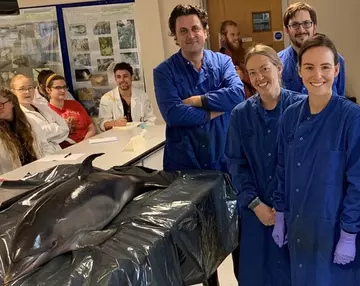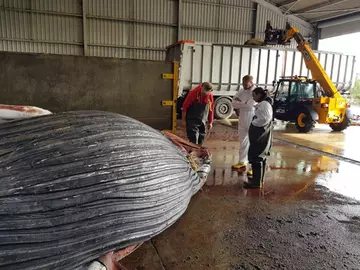
Marine Predators
Conservation
Anthropogenic impacts
Institute of Zoology
Zoological Society of London
Regent's Park
London
NW1 4RY
Using data and information collected as part of post-mortem investigations can help understand drivers of mortality in marine predators.
Rosie works in collaboration with the UK Cetacean Strandings Investigation Programme (CSIP) and the Ocean Predator Lab (OPL) at the Institute of Zoology, to assess the health of marine predators in relation to anthropogenic stressors (e.g., noise and chemical pollution). Rosie uses information collected as part of post-mortem investigations, carried out by CSIP, to understand the drivers of mortality in marine predators.

Rosie's work to date has focused on assessing the ecotoxicological status of marine predators including: modelling the spatiotemporal trends of pollutants; investigating relationships between pollutant burdens and indices of health (e.g. immune and reproductive systems suppressions) and assessing toxicity and risk in relation to other stressors. Rosie's current interests lie in developing new methods to understand the impacts of chemical pollution on wildlife health and exploring ways to better characterize and understand the cumulative impacts of anthropogenic stressors.

2023-Present: Visiting Lecturer, Royal Veterinary College, UK
2021-Present: Postdoctoral Researcher, Institute of Zoology, ZSL, UK
2017-2021: PhD Candidate, Institute of Zoology, ZSL, Brunel University, London NERC DTP
2012-2017: Barclays Bank, Data Analyst
2008-2012: MEng Chemical Engineering with Environmental Technology, Manchester University
Williams, R.S., Brownlow, A., Baillie, A., Barber, J.L., Barnett, J., Davison, N.J., Deaville, R., ten Doeschate, M., Penrose, R., Perkins, M., et al. (2023). Evaluation of a marine mammal status and trends contaminants indicator for European waters. Sci. Total Environ. 866, 161301.
Williams, R., Curnick, D.J., Brownlow, A., Barber, J.L., Barnett, J., Davison, N.J., Deaville, R., ten Doeschate, M., Perkins, M., Jepson, P.D., et al. (2021). Polychlorinated biphenyls are associated with reduced testes weights in harbour porpoises (Phocoena phocoena). Environ. Int., 106303.
Williams, R., ten Doeschate, M., Curnick, D.J., Brownlow, A., Barber, J.L., Davison, N.J., Deaville, R., Perkins, M., Jepson, P.D., and Jobling, S. (2020). Levels of polychlorinated biphenyls are still associated with toxic effects in harbor porpoises (Phocoena phocoena) despite having fallen below proposed toxicity thresholds. Environ. Sci. Technol. 54, 2277–2286.
Williams, R., Curnick, D.J., Barber, J.L., Brownlow, A., Davison, N.J., Deaville, R., Perkins, M., Jobling, S., and Jepson, P.D. (2020). Juvenile harbor porpoises in the UK are exposed to a more neurotoxic mixture of polychlorinated biphenyls than adults. Sci. Total Environ. 708.
